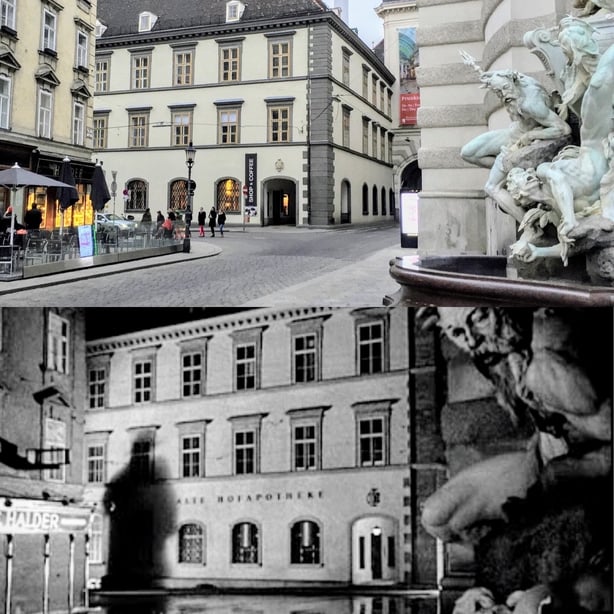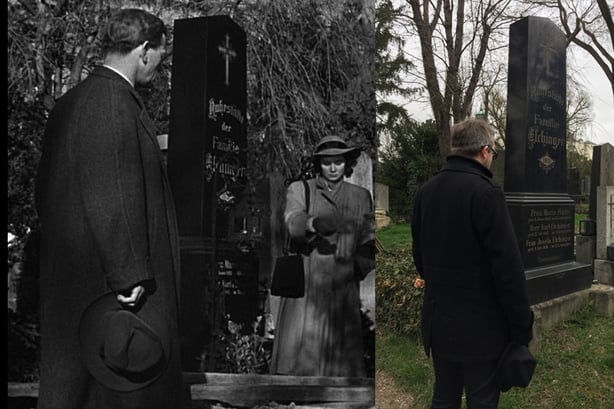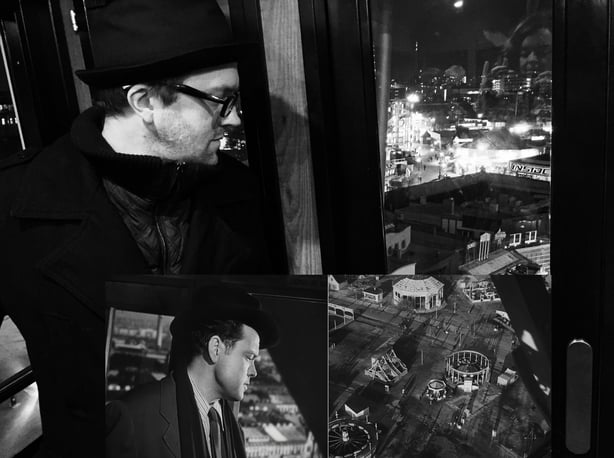Dec 24, 2024
Sep 10,2024
I never knew the old Vienna before the war with its Strauss music, its glamour and easy charm. I wasn't actually born yet, so you know, how could I. Now, my holidays to date could be divided up into four zones: Portrane, London, Amsterdam and New York. Good places, on the whole, did their best to make you welcome.
Oh, I was gonna tell you, wait, I was gonna tell you about Orson Welles, the boy wonder. And the time I went all the way to Vienna to visit the locations of his most celebrated work. Well, after Citizen Kane that is. His
name was Lime, Harry Lime. Now, I was broke, getting my life back together, and the woman I’d recently fallen in love with, invited me, I don’t know, on some sort of vacation. Anyway, there I was, lucky chap. Happy as a lark and without a cent… (Cue zither)
The Third Man, which celebrates its 70th anniversary this year, is not an Orson Welles’ picture - in so much that he didn’t direct it, write it, or for that matter star in it. The film has many parents: screenwriter Graham Greene, producers Alexander Korda and David O.Selznick, and director Carol Reed. Orson is on screen for approximately ten of the hundred and four minutes running time. And that was sufficient enough to make him a star throughout the world - proof positive of the old acting adage: there are no small parts, only small actors.
For, believe it or not, Orson was not a screen star until Harry Lime was born. For most of the 1940s, he was the king of American radio - fame born on another planet: Mars, to be exact. He convinced America it was being invaded by Martians with his legendary broadcast on CBS of H.G. Wells' (no relation) War Of The Worlds in 1938. His subsequent radio career partly financed all his adventures on the stage with his acting troupe, the groundbreaking Mercury Theatre. Soon enough, the movies came knocking on the door - and when he answered...he flopped. That’s right, the greatest movie ever made, Citizen Kane, like many great pictures, tanked on its initial release.

Often his own worst enemy, Orson had alienated many figures in Hollywood by the time he left America for Europe in 1948. He was to remain a tax exile for the best part of a decade and didn’t permanently settle back home until the 1970s. Producer David O. Selznick was initially resistant to director Carol Reed’s idea to cast Welles as mercurial criminal Harry Lime, even calling him 'box office poison’. Though Orson had directed several films after Kane, and acted in many more, none of them had really been breakout commercial hits. Plus, to be frank, Orson could be a bit of a pain to work with, so why go to all the trouble?

But Carol Reed was certain he found his Harry in Welles. After much to-ing and fro-ing and even some pursuing across Italy - Orson had got wind he was the actor most wanted for the part, and led the filmmakers on a merry chase (all to drive his fee up) before signing a deal with the movie’s European producer, Alexander Korda. It helped that one of his closest friends, and former Mercury company trouper, Joseph Cotten, was ostensibly playing the film’s leading man, hack writer, Holly Martins.
If you’ve never seen the movie before, or even if you have, perhaps you won’t want to read the next paragraph or so. Orson hated the Vienna sewers. Who wouldn’t? But he was not going to go down that stinky black hole for any director, even Carol Reed, whom he respected. And that respect was mutual. Reed loved Welles' Citizen Kane, The Stranger and The Lady From Shanghai, all of which influenced his shooting style on The Third Man. And he knew how to talk to Orson without pushing his buttons.

Still, there was no getting the boy wonder down that sewer, so many of the scenes were shot with a double, Reed himself. Not all of them though, and the director had to rebuild sections of the Vienna sewer in Shepperton Studios back in London when he needed Orson on screen in the flesh. There was no rebuilding Vienna though, which was ironic as the city itself was still in the throes of being rebuilt following the Second World War. There were bombed out buildings and streets everywhere, and Welles shot on location for at least a week.

Unlike Kane before it, this classic was a huge hit on its release. The number one film of the year in the UK and much of Europe. Orson was now a worldwide household name. The Viennese were not so impressed. The movie played there for a couple of weeks then kind of disappeared. To my surprise, I discovered during my visit, despite there being a Third Man museum in Vienna (an absolute must-see), and a wonderful walking tour, it is in fact not generally a well known, or loved, film in Austria. When people do know what you’re talking about, they tend to say ‘Oh, the sewer film.’
LIke the man himself, the location of Harry’s grave in Vienna’s Zentral-Friedhof cemetery was a bastard to find. 1980’s Austrian pop sensation, Falco (Rock Me Amadeus), is also buried there. You can’t miss his giant glass memorial. We found Beethoven, Brahms and Mozart (the actual Amadeus). I even tripped over the last resting place of James Bond villain, Stromberg from The Spy Who Loved Me, aka Curt Jurgens. But, true to form, just when we gave up Harry for lost...there he was.

Orson was not the only one surprised by his newfound international fame. Anton Karas went from an unknown musician playing at cafes (where director Carol Reed encountered him) to worldwide international fame, performing in sold-out theatres and to royalty. Anton is the performer and author of the tune you’ll be humming as you leave the cinema. Possibly the most pleasant musical earworm ever composed.
Final word goes to Orson, as credit where credit is due, the most memorable and famous piece of dialogue in the movie he did in fact write himself: "You know what the fellow said – in Italy, for 30 years under the Borgias they had warfare, terror, murder and bloodshed, but they produced Michelangelo, Leonardo da Vinci and the Renaissance. In Switzerland, they had brotherly love, they had five hundred years of democracy and peace – and what did that produce? The cuckoo clock."

Whatever you do, do not leave Vienna without visiting both the Third Man museum and join the walking tour - it doesn’t include the central cemetery though. You have to take a tram for that, and then, like Holly Martins, you’ll be chasing Harry’s ghost from one end to the other. Until then, experience this Renaissance cuckoo-clock of a film at a three-hour event celebrating its 70th anniversary on October 1st at the Irish Film Institute and other cinemas across the country - more details here.